When coping with grief and loss, recognize emotional signs like withdrawal, persistent sadness, and changes in sleep or appetite. Support seniors by offering patience, understanding, and opportunities to share memories. Encourage healthy habits such as regular activity, social engagement, and mindfulness practices. Building a strong support network and seeking professional help when needed can make a big difference. If you want practical tips to help your loved ones through tough times, there’s more to discover here.
Key Takeaways
- Recognize subtle emotional signs of grief, such as withdrawal or persistent sadness, for early intervention.
- Support multiple losses with compassionate communication, cultural sensitivity, and connection to support groups or counseling.
- Encourage community engagement through activities, social groups, and volunteer work to reduce loneliness and build resilience.
- Promote self-care practices like proper sleep, nutrition, mindfulness, and hobbies to help manage grief effectively.
- Utilize therapeutic resources such as grief counseling, senior programs, and trauma-focused therapies to facilitate emotional healing.
Recognizing the Emotional Signs of Grief in Older Adults
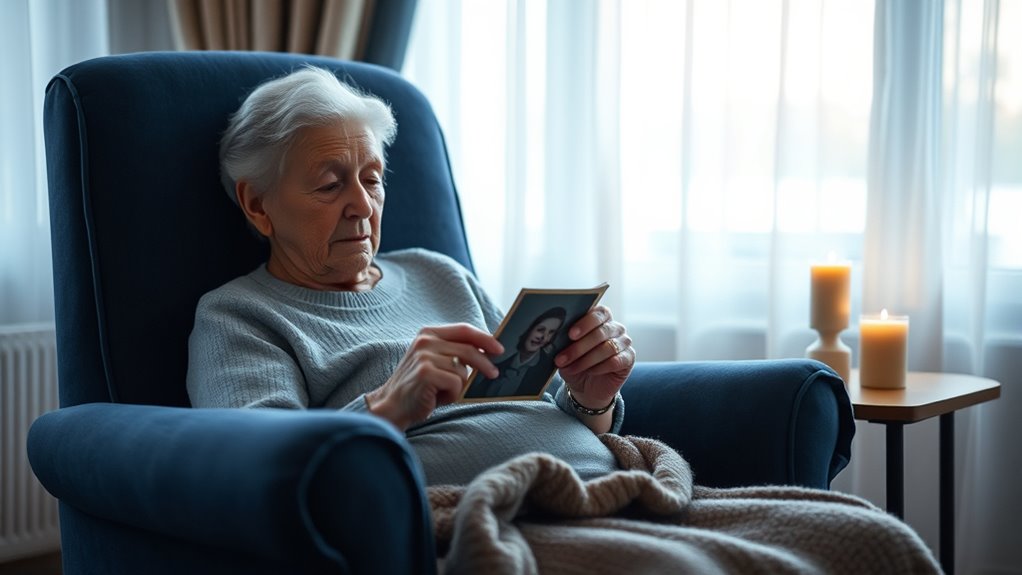
While older adults may not openly show their grief, paying close attention to subtle emotional changes can help you recognize when they’re struggling. Emotional signs in older adults often include withdrawal, decreased activity, or persistent sadness. They may seem less engaged in social activities or avoid conversations about their loss. Acknowledging that emotional signs can vary greatly among individuals is crucial for providing appropriate support. Watch for difficulty verbalizing feelings or avoiding discussions altogether, as these can signal emotional distress related to grief. Feelings of loneliness and sadness may linger long after the initial loss, impacting their mood. Additionally, the availability of local resources can play a significant role in helping seniors cope effectively. Recognizing these emotional signs allows you to understand their grief better and provide the support they need during this challenging time. Furthermore, innovative materials in supportive programs can enhance their comfort and engagement, aiding in emotional healing. Physical signs like fatigue, sleep disturbances, or a loss of appetite can also be linked to emotional reactions. It is also important to remember that individual coping mechanisms greatly influence how grief manifests, which requires personalized approaches. Recognizing these emotional signs allows you to understand their grief better and provide the support they need during this challenging time.
Supporting Seniors Through Multiple Losses
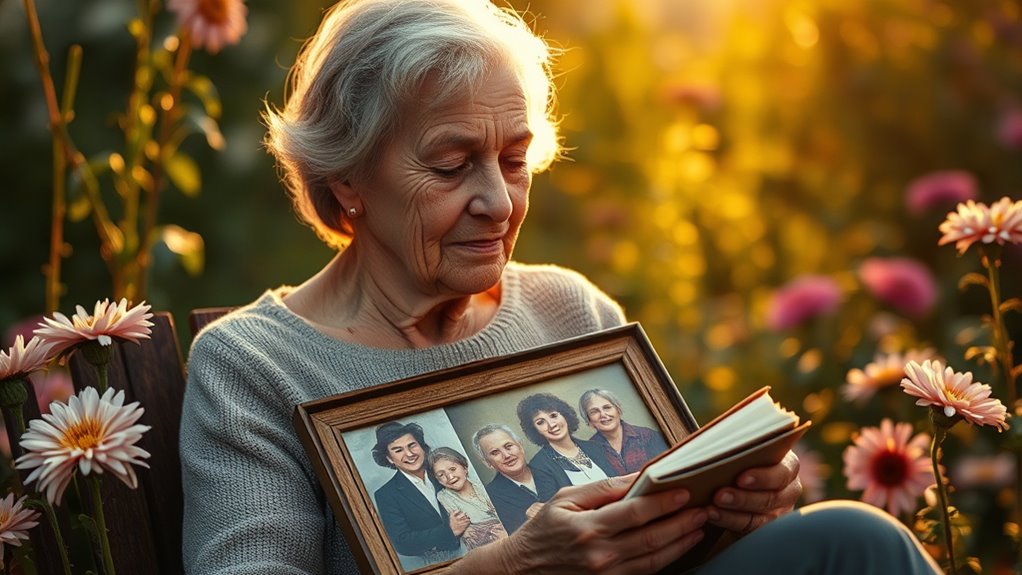
Supporting seniors through multiple losses requires a thoughtful and sensitive approach, as experiencing several significant setbacks in a short period can greatly intensify their grief. To help, focus on providing consistent emotional support and creating opportunities for them to share memories. Recognize that each loss may need to be addressed separately to prevent emotional overwhelm, especially considering that cultural differences can influence how grief is expressed and managed. Offer coping strategies tailored to their needs, encouraging open conversations and patience. Be attentive to signs of compounded grief, such as withdrawal or persistent sadness, and intervene early. Connecting seniors with support groups or counseling that specialize in multiple losses can foster a sense of community and healing, and being aware of emotional reactions is crucial in providing appropriate assistance. Additionally, understanding cultural and regional grief practices can help tailor support to be more respectful and comforting. Incorporating specialized grief resources into their support plan can also provide targeted assistance for complex grief reactions. By combining these approaches, you help seniors process their loss more effectively and rebuild their emotional resilience.
Encouraging Healthy Coping Mechanisms and Self-Care Practices
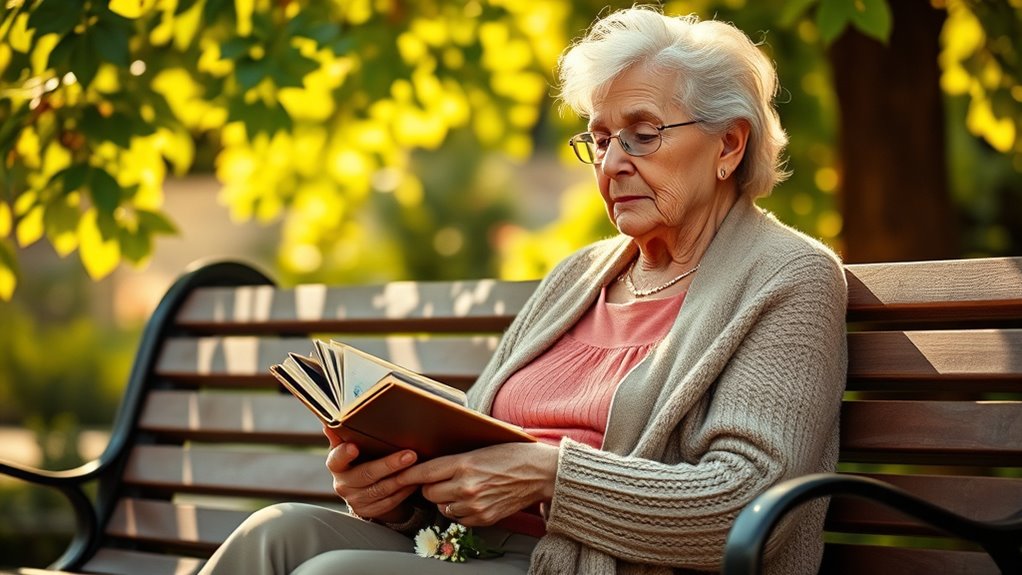
After providing emotional support through multiple losses, encouraging seniors to adopt healthy coping mechanisms and self-care practices can make a significant difference in their healing process.
Prioritizing self-care—such as getting enough sleep, eating balanced meals, and engaging in gentle physical activity—boosts emotional well-being and resilience.
Practicing mindfulness techniques like meditation, deep breathing, or journaling helps process grief and reduces stress.
Participating in hobbies like gardening or art offers a positive distraction and renewed purpose.
Connecting with support networks, including family, friends, or grief groups, provides essential emotional comfort and validation.
Being aware of well-being tips, such as maintaining social connections and managing stress, can further support emotional health during challenging times.
Understanding how self watering plant pots work can serve as a metaphor for nurturing oneself during times of grief, emphasizing the importance of consistent care and patience.
Research indicates that engaging in physical activity, such as walking or light exercise, can also improve mood and aid in emotional recovery.
Recognizing signs of prolonged sadness early and seeking professional help when needed can prevent further decline, supporting a healthier pathway through grief.
Additionally, exploring dog names can be a comforting activity, providing a sense of companionship and joy during difficult times.
Building a Supportive Network and Community Connections
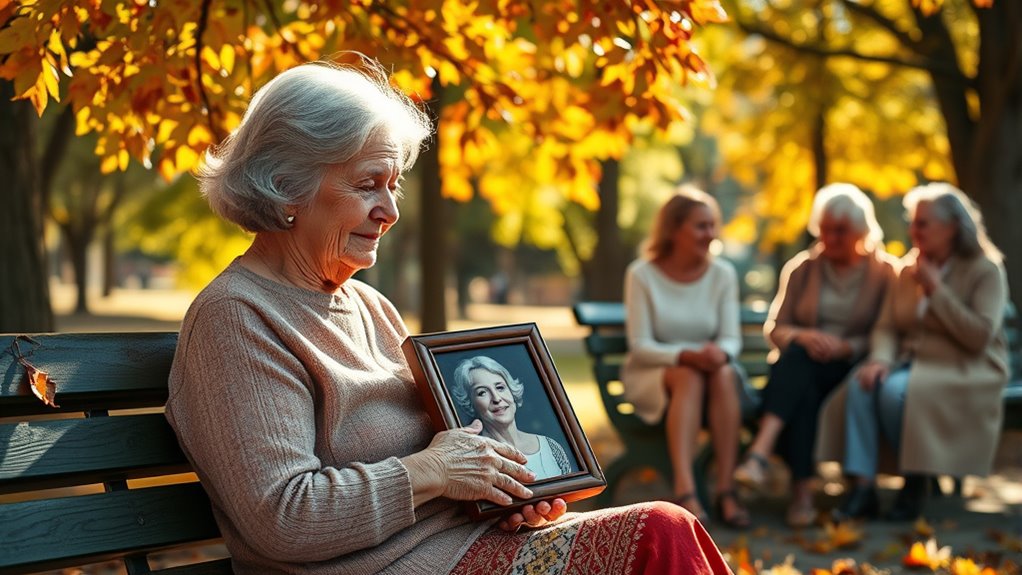
Building a strong support network is essential for your emotional well-being. Participating in community activities and support groups helps you stay connected and reduces feelings of loneliness. Engaging with multimedia platforms like podcasts and videos can also provide valuable information and foster a sense of community. Community engagement through multimedia offers accessible avenues for connection and sharing vital community services. Incorporating media literacy skills into your planning can also enhance your ability to utilize these platforms effectively, ensuring that your engagement efforts are safe and effective. Developing digital literacy can further improve your capacity to discern reliable information and navigate online resources confidently.
Engaging in Community Activities
Getting involved in community activities can be a powerful way for seniors to stay connected and find emotional support. Participating in senior centers, clubs, or social groups helps reduce loneliness and offers a sense of belonging.
Engaging in group events like exercise classes, hobby groups, or cultural outings fosters social connections that strengthen emotional resilience. These activities also provide opportunities to build new friendships, which can protect against depression and feelings of isolation after loss.
Regular community involvement promotes mental health and creates a supportive network. To maximize benefits, consider:
- Joining local clubs or hobby groups
- Attending cultural or social events
- Participating in fitness or exercise classes
- Volunteering within the community
Research shows that social engagement can significantly improve emotional well-being and help manage grief more effectively. This active engagement boosts community connection, enhances emotional support, and helps navigate grief more effectively. Additionally, engaging in community participation can provide a sense of purpose, which is vital for emotional healing during times of loss. Developing social skills can also improve interactions within these activities, leading to more meaningful connections and sustained support.
Connecting With Support Groups
Connecting with support groups offers seniors an essential way to strengthen their emotional resilience and forge meaningful community bonds. Support groups provide a safe space to share grief experiences, which can reduce loneliness and promote emotional healing. When you join a bereavement support group, you’ll find that mental health improves as depression decreases and resilience grows. Community-based groups often include educational resources and coping strategies tailored to aging and grief, helping you navigate these challenges more effectively. Regular participation helps build a network of peers who understand your emotional struggles, enhancing social connectedness. Data shows that seniors involved in support groups report feelings of hope, acceptance, and better overall well-being, making these groups a crucial component of your grief recovery journey. Additionally, engaging in activities like fruit juice varieties can promote overall health and well-being, supporting your resilience during difficult times. Recognizing the importance of emotional support can further motivate participation and foster lasting connections. Furthermore, understanding the role of support group confidentiality can encourage trust and openness among members, enriching the healing process. Establishing healthy boundaries within the group can help create a respectful and safe environment for all participants. Incorporating local resources can also provide additional assistance and community engagement opportunities to strengthen your support network.
Monitoring for Depression and When to Seek Professional Help
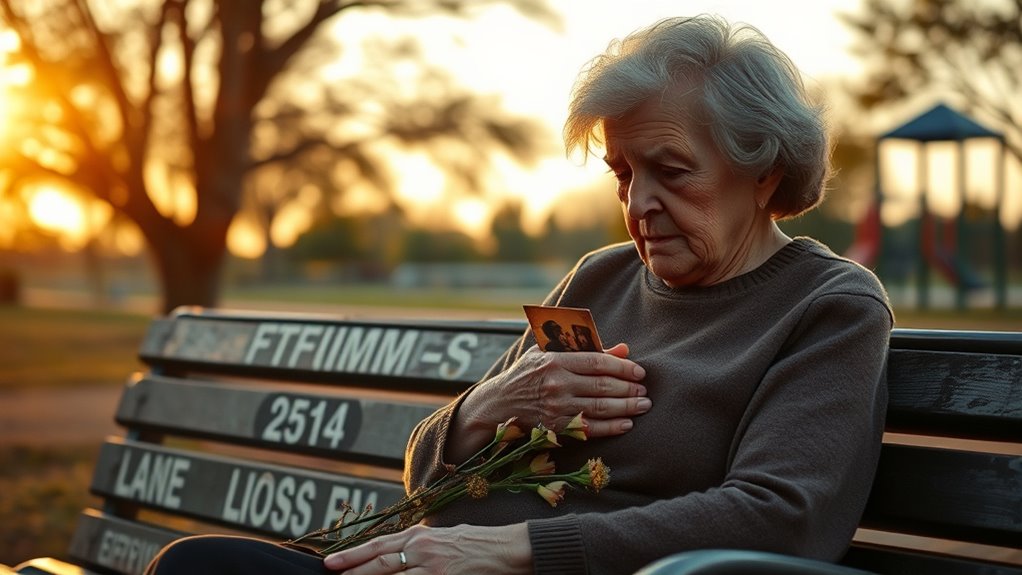
Pay attention to persistent feelings of sadness, hopelessness, or loss of interest that last longer than two months, as these may signal depression.
Be aware that physical changes like altered sleep, appetite, or energy levels, along with emotional symptoms, can also suggest a need for medical help.
If you notice these signs, talking to a healthcare provider can ensure you get the support or treatment you need to feel better.
Warning Signs to Watch For
Recognizing the warning signs of depression in seniors is essential for timely intervention. Changes in emotional reactions or mental well-being can signal underlying issues. Be alert for:
- Persistent feelings of sadness, hopelessness, or worthlessness lasting over two months
- Changes in sleep patterns, like insomnia or oversleeping
- Decline in appetite, unexplained weight loss, or low energy
- Withdrawal from social activities, hobbies, or neglecting personal care
These warning signs can indicate worsening depression or grief. If you notice any of these, it’s important to address them early.
Paying attention to emotional reactions and mental well-being helps ensure your loved one receives the support they need, preventing further decline and promoting recovery.
When to Consult Healthcare Providers
Knowing when to seek help is crucial if your senior loved one shows signs of persistent emotional distress. If grief symptoms last beyond two months or worsen, it’s time to consult a healthcare provider to evaluate their mental health.
Look for warning signs like ongoing sadness, loss of interest in activities, sleep problems, or appetite changes. These could indicate depression rather than normal grief.
If your loved one has thoughts of self-harm or suicide, seek immediate professional support.
Healthcare providers can help distinguish between normal grief and clinical depression, guiding appropriate treatment such as therapy or medication.
Regular check-ins are essential if emotional symptoms interfere with daily life or well-being.
Don’t hesitate to seek support—early intervention can make a significant difference in your loved one’s recovery.
Utilizing Resources and Therapeutic Approaches for Healing
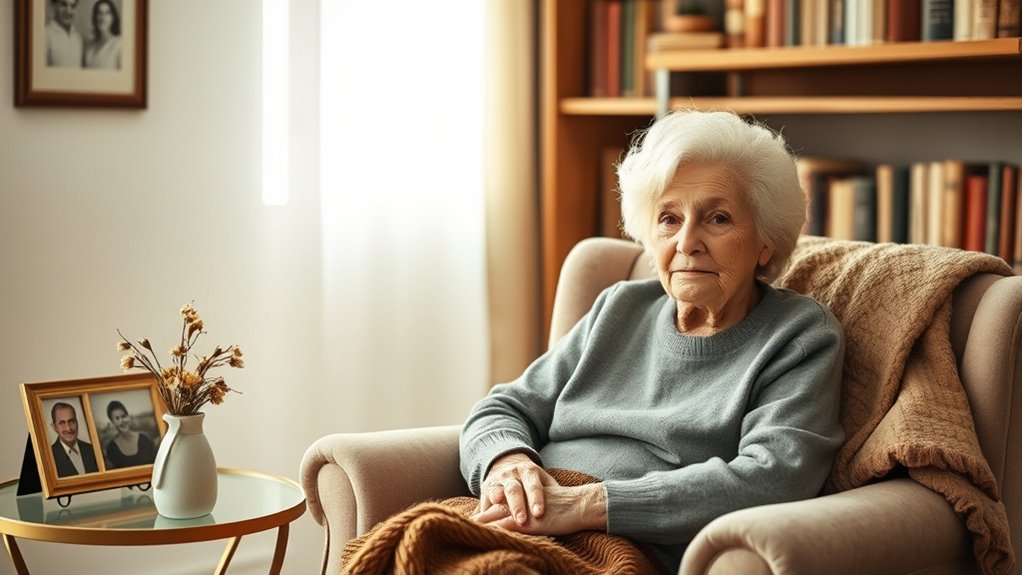
Utilizing available resources and therapeutic approaches can considerably aid seniors in the healing process after experiencing loss. Engaging in therapeutic approaches like grief counseling and support groups helps reduce loneliness and depression.
Engaging in grief counseling and support groups can significantly ease the healing process for seniors.
Support systems such as senior centers and bereavement programs offer accessible emotional support and education on coping strategies. Evidence shows trauma-focused therapies, including cognitive-behavioral therapy (CBT), help process complex grief and build resilience.
Participating in structured therapeutic activities can improve mental health, decreasing grief-related symptoms. To maximize healing, consider:
- Joining support groups for shared experiences
- Attending community-based bereavement programs
- Exploring trauma-focused therapies like CBT
- Utilizing professional mental health services
These approaches foster emotional recovery and help you develop effective coping strategies.
Frequently Asked Questions
How Do Older Adults Deal With Loss and Grief?
When you face loss and grief, you often turn to social support and sharing memories to help process your emotions.
Engaging in community activities, hobbies, or spiritual practices can also provide comfort.
You might find relief in counseling or support groups, which give you a safe space to express feelings.
Reminiscing and maintaining meaningful routines help you manage grief, making the healing process feel more manageable over time.
What Are the 3 C’s of Grief?
The 3 C’s of grief are Cognize, Cope, and Connect. You recognize and accept the reality of your loss, which helps you process your emotions.
Then, you use healthy coping strategies like self-care and seeking support to manage your feelings.
Finally, connecting with loved ones and sharing memories fosters healing and reduces loneliness.
These steps guide you through your grief journey with resilience and understanding.
What Are Some Coping Strategies for Grief?
When facing grief, you can try engaging in activities you enjoy, like hobbies or volunteering, to help shift your focus and find purpose.
Practice mindfulness through meditation or deep breathing to ease emotional tension.
Connecting with support groups or talking openly with trusted loved ones allows you to share feelings and gain comfort.
Maintaining routines like exercise, healthy eating, and sleep strengthens your resilience, making it easier to navigate your emotions.
What Are Coping Strategies for the Elderly?
Imagine life as a garden—you tend to it with care and patience.
As an elderly person, you can nurture your well-being by joining support groups, engaging in hobbies, and practicing mindfulness.
Keep social connections alive, prioritize self-care like exercise and sleep, and seek professional help when needed.
Education through community programs can also empower you, helping you grow resilient and find joy amidst life’s changes.
Conclusion
Remember, grieving is a journey, not a race, and supporting seniors through loss takes patience and compassion. By recognizing emotional signs, encouraging healthy coping, and staying connected, you can help them navigate this difficult time. Keep in mind that seeking professional help is a sign of strength, not weakness. With your support, they can find healing and regain their footing—because sometimes, it’s only through the storm that the sun begins to shine again.









